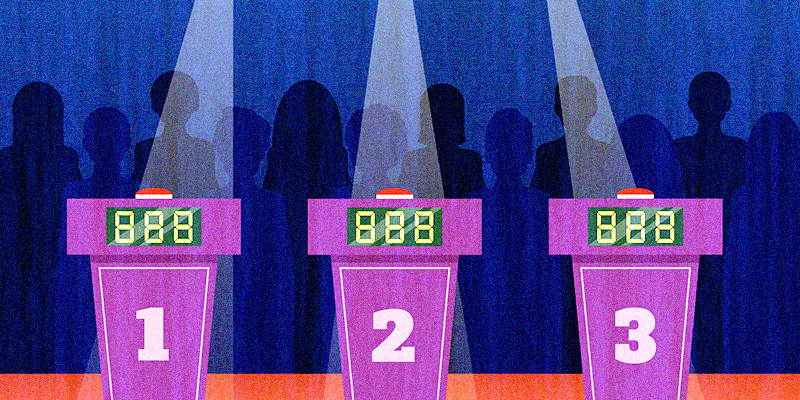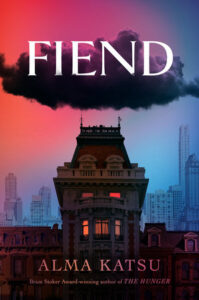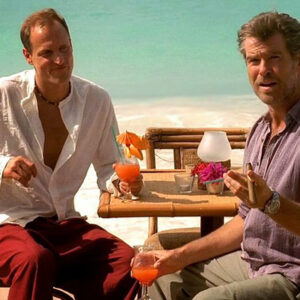My husband and I were watching Andor the evening of May 6th when my phone rang.
It was my mother-in-law calling to tell us that one of my books, The Hunger, had been an answer on Jeopardy.
In the following hour, I got texts, emails, and many, many notifications on Bluesky, Facebook, and elsewhere from friends and friends-of-friends all informing me of this lightning-strike, this blessing from the gods. A neighbor sent me a video clip. It was, as you can imagine, a surreal moment.
Coincidentally, earlier in the day, I had been interviewed by a pair of students for their podcast and one asked when I’d known that I’d “made it” as a writer. I laughed (politely) because I don’t know that any writer, except for perhaps James Patterson, ever truly believes they’ve permanently crossed that threshold. Most writers are lucky if they’re allowed to visit that sunny shore for a season or two, to feel that rare, rare sun on your face for even the briefest of time.
But this is surely one of those moments, so I thank the unknown Jeopardy writer who decided to make my book the answer to “21st century fiction for $1200.” Sadly, none of the contestants knew the correct response, which you’d think they’d have been able to figure out from the clue even if they hadn’t read the novel. Maybe a more pointed category would’ve helped: “Forgotten American history for $400?” “Great moments in cannibalism for $800?” (I’m sure you’ve guessed by now that the answer is the Donner Party. Context is everything.)
I’m still processing, but it puts me in mind of other exciting moments in my 15-year writing career. For impact on social media and boosted name recognition, nothing beats when Stephen King tweeted that The Hunger was “deeply, deeply disturbing”. I was on the road promoting the book when it happened and have told the story of that moment so many times that I won’t repeat it here, but the seriously crazy part to me, a former social media researcher, was experiencing virality. I’d studied when it happened to others but never personally experienced that tsunami of likes, comments, and reposts until that day. There were thousands of such reactions every hour, lasting about 24 hours. Like most everyone who is blessed (broadsided?) by virality, I was unprepared for the deluge.
Another bucket list moment was the time someone in an airport boarding area was reading one of my books. This happened with The Taker, my debut. I never imagined I’d catch someone reading a book of mine in the wild, and as often as I’ve told this story, I’ve yet to have another author say it’s happened to them. Would you introduce yourself, if this were you? I decided to approach her, so I could capture the moment with a picture—and she didn’t believe me. She made me show her an ID.
There have been several such moments in my writing career, now that I think about it. My first—and only—panel at San Diego Comic Con, I was to appear with Christopher Nolan (he ended up a no-show due to problems with The Dark Knight, or so we were told, but his writing partner Michael Cassutt was there), Max Allan Collins (The Road to Perdition) and the wonderful and generous novelist Rachel Caine, among others. I was the debut newbie and didn’t know how lucky I was or that I’d never be this close to so much star power again.
There would be a few more occasions like that. An Italian press tour for the release of The Taker. My first film option, to Ridley Scott for The Hunger. These are the moments you allow yourself to dream about as you type away for the eighth hour of the 143rd day in a row on your work-in-progress. Fuel to keep the fire burning as you wonder if anyone will find your little book when it’s released or why the last one didn’t sell as well as you’d hoped.
After the Jeopardy lightning strike, the comment most frequently said to me was, “you’re famous!” I cringed to hear this because I know that I’m not. I’m not whining: few authors are, particularly in the way we think of celebrity nowadays. But I also cringe because I hear the wistfulness in their words: celebrity is what everyone wants these days, more so than it any previous era (thank you, social media). Being famous is more important than what you’re famous for—just ask any reality show star.
An appearance on Jeopardy’s big board is on many people’s bucket list, a validation made all the sweeter because it’s not something you can do for yourself. It is something you must earn—at least in the eyes of the show’s writers. I had never hungered (sorry) for or expected this kind of affirmation for this very reason: you can’t force it. And even if it comes to you, what does it signify? You can hardly claim to be an icon when there are dozens, hundreds, thousands of novels more deserving, more fixed in the popular consciousness, than yours.
I hope I don’t sound ungrateful. I’ve never been one to savor the good times, and I see now that’s wrong. I tend to forget them as I push, push, push on the next project. Those student podcasters had asked, too, how writers deal with rejection, and I was sorry to have to tell them that the disappointments in this business are endless. As in any walk of life, the noes will outnumber the yeses. Social media (which no writer can afford to ignore) reminds us daily of the attention and opportunities that are going to our peers and not to us. That we are getting passed over and falling behind. That’s the flip side of popularity.
All the more reason to celebrate times like this. If happiness is the byproduct of absorption (T.E. Lawrence), then moments such as these are the only reward we can hope for. Enjoy the journey as it unfolds and enjoy the rare moments of recognition. Remember: you’ve worked hard for this. You deserve it.
***


















